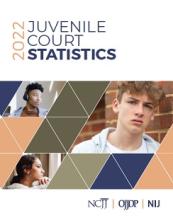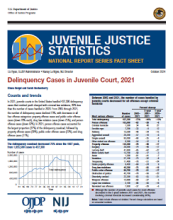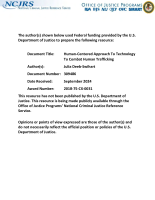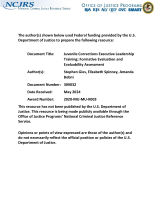Sex
Essays on Mental Health, Education, and Parental Labor Force Participation
Juvenile Court Statistics, 2022
Individual, Firearm, and Purchasing Characteristics Associated with Risk of Firearm-related Violent Crime Arrest: a Nested Case-control Study
Longitudinal Cohort Study: Predictive Validity of the Structured Assessment of Violence Risk in Youth Individual/Clinical Risk Factor on Recidivism Among Mississippi Justice-Involved Youth
Testing the Invariance of Warrior and Guardian Orientations on the Prioritization of Procedural Justice: Do Officer Demographics Matter?
Outcomes Associated with Arrest for Domestic Violence: A Systematic Review and Meta-Analysis
An Evaluation of Crime Victim Compensation in West Virginia: Part of a National Study of Victim Compensation Program
Just Science Podcast: Just Rapidly Identifying Drugs Involved in Suspected Overdoses
Delinquency Cases in Juvenile Court, 2021
Celebrating 10 Years of NIJ’s Law Enforcement Advancing Data and Science (LEADS) Scholars Program - 2024 NIJ Research Conference
In 2014, NIJ established the Law Enforcement Advancing Data and Science (LEADS) Scholars Program to support research-minded, mid-career sworn law enforcement officers working to integrate research into agency policy and practice. The LEADS Scholars Program helps participants develop independent research and provides support to identify current evidence on priority issues.
See the YouTube Terms of Service and Google Privacy Policy
Validating the ASB 122: Best Practice Recommendation for Performing Alcohol Calculations in Forensic Toxicology
Persistence and Desistance across Generations: A Longitudinal Investigation
Assessing the Relationship between Immigration Status, Crime, Gang Affiliation, and Victimization
The Prevalence and Nature of Victimization among First Semester Students at Urban, Hispanic-Serving Institutions (HSIs)
Five Things About Women and Reentry
Redesigning Life in U.S. Prisons
The prison system in the U.S. typically places a heavy emphasis on security, control, and punishment, and this foundation can create an adversarial culture within correctional facilities — incarcerated individuals versus correctional staff. But what if that culture could change? What would it look like? How would it impact not only incarcerated individuals but also correctional officers and other staff?
SAVRY Predictive Validity of Mississippi Justice-Involved Youth Recidivism: A Latent Variable Approach
Understanding the Impact of COVID-19 on Victim Services
Understanding the Impact of COVID-19 on Victim Services
The COVID-19 pandemic had a detrimental impact on communities across the nation and significantly affected various aspects of individuals’ lives. One of the negative impacts was an increase in gender-based violence accompanied by shifting barriers to accessing services and support. Victims and victim service providers faced various challenges dealing with the increase in need for services, navigating barriers to help-seeking, and addressing logistical issues.
See the YouTube Terms of Service and Google Privacy Policy







